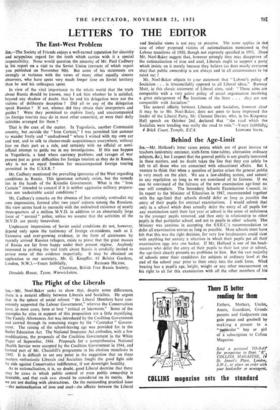The Plight of the Liberals
Sut,—Mr. Noel-Baker seeks to show that, despite some differences, there is a natural affinity between Liberals and Socialists. He argues that in the sphere of social reform " the Liberal Members have con- sistently supported the Labour Government," whereas the Conservatives have, in most cases, been at best " critical or lukewarm." Some of the examples he cites in support of this proposition are a little mystifying. The Family Allowances Act was introduced by the Coalition Government and carried through its remaining stages by the " Caretaker " Govern- ment. The raising of the school-leaving age was provided for in the Butler Education Act. The National Insurance Act embodies, with a few modifications, the proposals of the Coalition Government in the White Paper of September, 1944. Proposals for` a comprehensive National Health Service were accepted by the Coalition Government in 1944, and formed part of Mr. Churchill's programme in his election manifesto in 1945. It is difficult to see any point in the suggestion that on these matters enthusiastic Liberals and Socialists fought the good fight side by side against Conservative indifference, if not downright hostility.
As to nationalisation, it is, no doubt, good Liberal doctrine that there may be cases in which public control or even public ownership is desirable, and that each case should be considered on its merits. But we are not dealing with abstractions. On the outstanding practical issue —the nationalisation of iron and steel—the affinity between the Liberal
and Socialist views is not easy to perceive. The same applies in th case of other proposed victims of nationalisation mentioned in the Labour manifesto of 1950, though not expressly specified in 1951. D Mr. Noel-Baker suggest that, however strongly they may disapprove of the nationalisation of iron and steel, Liberals ought to support a party which insists on it merely because they believe (as does nearly everyonal else) that public ownership is not always and in all circumstances to be ruled out ?
Mr. Noel-Baker objects to your statement that "Labour's policy or Socialism - . - is irreconcilably opposed to all Liberal ideas." Ramsay Muir, in this classic statement of Liberal aims, said: " These aims aro compatible with a very active policy of social organisation involving a great enlargement of Se functions of the State . . . they are not compatible with Socialism."
The natural affinity between Liberals and Socialists, however clear it may be to Mr. Noel-Baker, does not seem to have impressed the leader of the Liberal Party, Mr. Clement Davies, who, in his Kingsway Hall speech on October 2nd, declared that " the road which the Socialists were treading was really the road to ruin."—Yours faithfully,


































 Previous page
Previous page